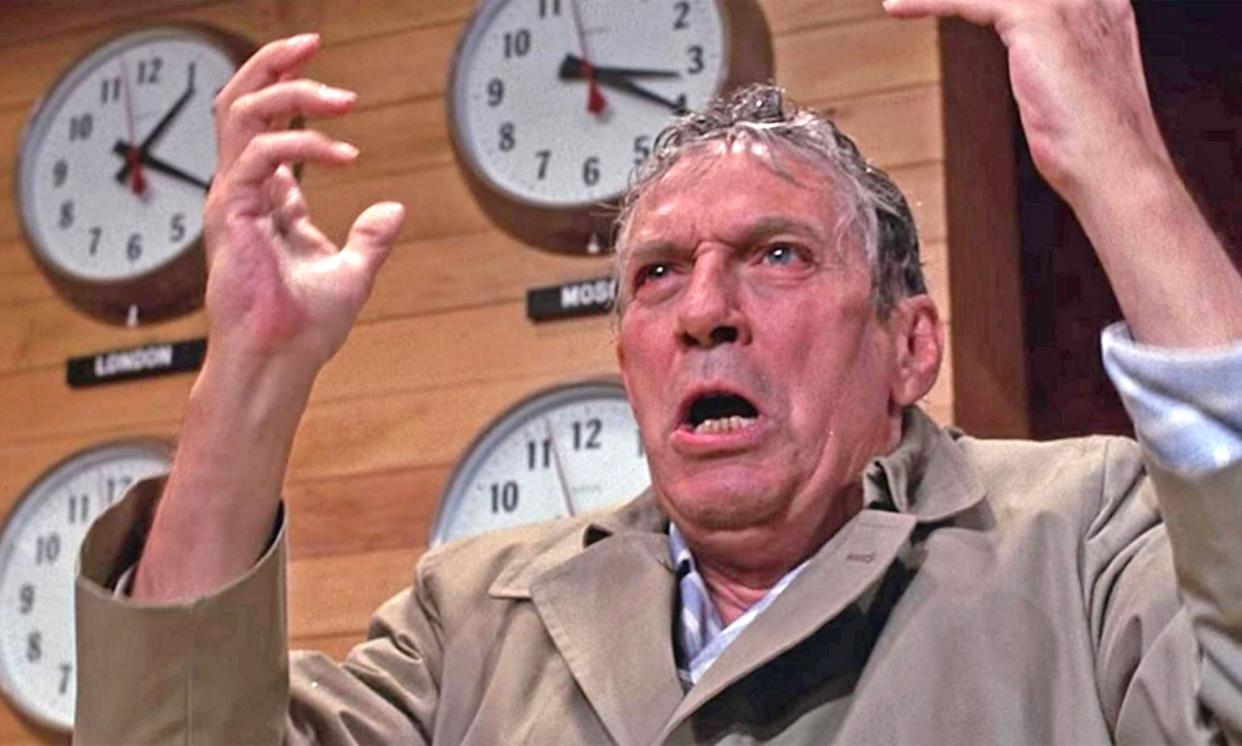Network review – terrific 1976 news satire is an anatomy of American discontent

‘The time has come to say … is ‘dehumanisation’ such a bad word?” The speaker is Howard Beale, the sweat-drenched, swivel-eyed TV news anchor in this classic 1976 satire from screenwriter Paddy Chayevsky and director Sidney Lumet, now on rerelease. Depressed by the loss of his wife and by getting fired due to dwindling audiences, Beale proclaims he will kill himself live on air and is then re-hired as a colossal popular and then populist success, his celebrity delirium turning him into a crazy prophet, telling millions of Americans to scream out of the window that they are as mad as hell and not going to take it any more. Beale is a mixture of Billy Graham, radio star Orson Welles telling America the Martians are coming, and that notorious ratings-obsessive Donald Trump.
Network finds its place in the distinctive Hollywood tradition of showing TV as meretricious, mindless and corrupt … as opposed, presumably, to movies. It’s a classic 70s mainstreamer, a terrifically well-made, well-written talking point to put alongside other richly enjoyable small-screen dramas such as Robert Aldrich’s The Killing of Sister George from 1968, James L Brooks’s Broadcast News in 1987, Robert Redford’s Quiz Show from 1994 – and Antonio Campos’s Christine, about Christine Chubbuck, the American TV news reporter who in 1974 really did kill herself live on the air. Chayevsky denied she was the inspiration for this film. Peter Finch gives an uproarious performance as Beale, for which he posthumously won the best actor Oscar after succumbing to a fatal heart attack in the lobby of the Beverly Hills Hotel – a fate hardly less satirical or poignant than Beale’s own.
Beale is the grizzled old news man for the fictional UBS network in New York, staring career death in the face. His only pal is veteran producer Max Schumacher, played by William Holden; a married man with two grownup daughters who humiliatingly falls in love with Diana Christensen, played by Faye Dunaway, the ruthless new TV exec who promotes Beale’s new ratings-topping celebrity, utterly unconcerned with Beale’s mental health or indeed that of the entire American nation. She can only climax sexually while babbling about ratings, and is also developing a Kardashian-style proto-reality show about a group of communists on the west coast called The Mao Tse Tung Hour. Meanwhile it turns out that the network’s new chief Arthur Jensen (Ned Beatty) is quite as crazy, or visionary, as Howard and tells him to keep going at all costs with a new message: patriotism and democracy don’t matter because the world is run by corporations.
The show’s bread-and-circuses satire may sound a little heavy-handed in summary, and some of the dialogue is pretty dated, especially when Diane, with withering sarcasm, expresses insincere regret for denigrating his bedroom performance: “I’m sorry I impugned your cocksmanship!” Surely this is the last time that word was seriously used in any Hollywood film. Yet Chayevsky’s script powers along, daringly immersing the audience in specialist TV jargon; suit-wearing guys (especially Robert Duvall’s foghorn-voiced manager Frank Hackett) will talk for minute after minute after minute about stats and affiliates, creating the ambient white noise of TV neurosis.
Network is not all cynicism. Holden and Beatrice Straight as his wife Louise have an intense, even passionate scene when he tells her he’s having an affair, and then Holden has an unashamedly heartfelt scene with Dunaway when he says he can’t bear being in love with her any more and confesses his fear of death. These are moments that seem to belong to another kind of film entirely.
Having begun as a five-seconds-into-the-future satire, Network becomes an anatomy of American discontent, born of inflation and rocketing gasoline prices and not especially aware of any boost from the forthcoming bicentennial. Finally it’s an outrageous conspiracy thriller. Like John Updike, Chayevsky and Lumet are here giving us Memories of the Ford Administration – only they weren’t memories at the time. This was America as it was happening, suicidal ideations born of a scotch hangover, beamed live into every home.
• Network is in UK cinemas from 28 June.
• In the UK and Ireland, Samaritans can be contacted on freephone 116 123, or email jo@samaritans.org or jo@samaritans.ie. In the US, you can call or text the National Suicide Prevention Lifeline on 988, chat on 988lifeline.org, or text HOME to 741741 to connect with a crisis counselor. In Australia, the crisis support service Lifeline is 13 11 14. Other international helplines can be found at befrienders.org

 Yahoo Movies
Yahoo Movies 
